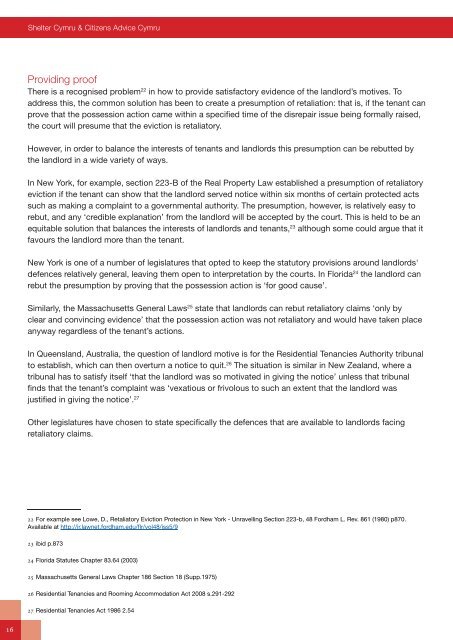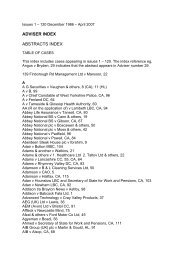Retaliatory eviction - Citizens Advice
Retaliatory eviction - Citizens Advice
Retaliatory eviction - Citizens Advice
Create successful ePaper yourself
Turn your PDF publications into a flip-book with our unique Google optimized e-Paper software.
Shelter Cymru & <strong>Citizens</strong> <strong>Advice</strong> CymruMaking rights real: preventing retaliatory <strong>eviction</strong>s in WalesProviding proofThere is a recognised problem 22 in how to provide satisfactory evidence of the landlord’s motives. Toaddress this, the common solution has been to create a presumption of retaliation: that is, if the tenant canprove that the possession action came within a specified time of the disrepair issue being formally raised,the court will presume that the <strong>eviction</strong> is retaliatory.However, in order to balance the interests of tenants and landlords this presumption can be rebutted bythe landlord in a wide variety of ways.In New York, for example, section 223-B of the Real Property Law established a presumption of retaliatory<strong>eviction</strong> if the tenant can show that the landlord served notice within six months of certain protected actssuch as making a complaint to a governmental authority. The presumption, however, is relatively easy torebut, and any ‘credible explanation’ from the landlord will be accepted by the court. This is held to be anequitable solution that balances the interests of landlords and tenants, 23 although some could argue that itfavours the landlord more than the tenant.New York is one of a number of legislatures that opted to keep the statutory provisions around landlords'defences relatively general, leaving them open to interpretation by the courts. In Florida 24 the landlord canrebut the presumption by proving that the possession action is ‘for good cause’.Similarly, the Massachusetts General Laws 25 state that landlords can rebut retaliatory claims ‘only byclear and convincing evidence’ that the possession action was not retaliatory and would have taken placeanyway regardless of the tenant’s actions.In Queensland, Australia, the question of landlord motive is for the Residential Tenancies Authority tribunalto establish, which can then overturn a notice to quit. 26 The situation is similar in New Zealand, where atribunal has to satisfy itself ‘that the landlord was so motivated in giving the notice’ unless that tribunalfinds that the tenant’s complaint was ‘vexatious or frivolous to such an extent that the landlord wasjustified in giving the notice’. 27Other legislatures have chosen to state specifically the defences that are available to landlords facingretaliatory claims.22 For example see Lowe, D., <strong>Retaliatory</strong> Eviction Protection in New York - Unravelling Section 223-b, 48 Fordham L. Rev. 861 (1980) p870.Available at http://ir.lawnet.fordham.edu/flr/vol48/iss5/923 ibid p.87324 Florida Statutes Chapter 83.64 (2003)25 Massachusetts General Laws Chapter 186 Section 18 (Supp.1975)26 Residential Tenancies and Rooming Accommodation Act 2008 s.291-29227 Residential Tenancies Act 1986 2.5416




![Annual review [ 1.4 MB] - Citizens Advice](https://img.yumpu.com/50679529/1/190x135/annual-review-14-mb-citizens-advice.jpg?quality=85)

![Help for helping your residents [ 2.4 MB] - Citizens Advice](https://img.yumpu.com/48848542/1/185x260/help-for-helping-your-residents-24-mb-citizens-advice.jpg?quality=85)







